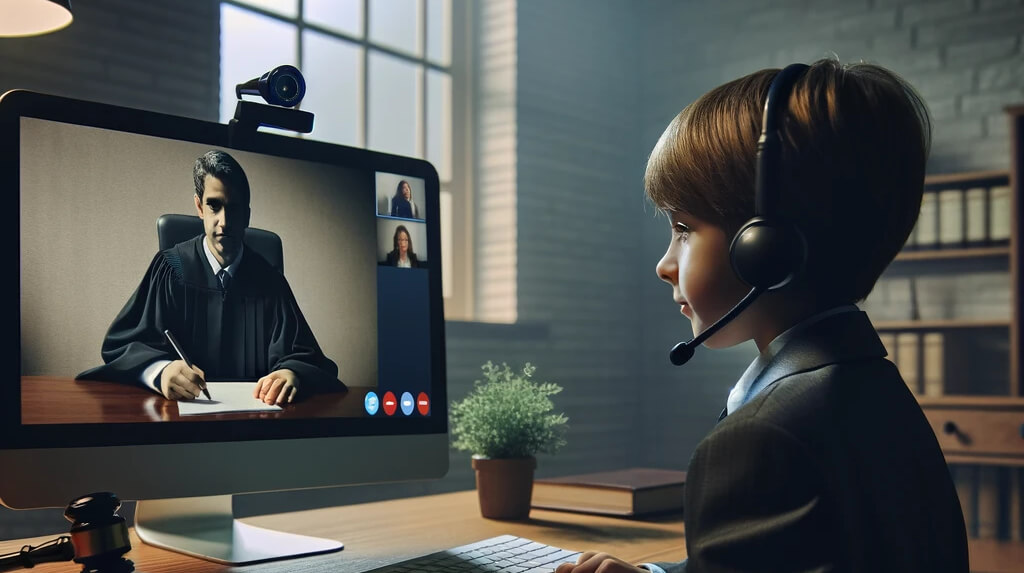Child Testimony in Family Law Cases
In family law cases, involving children as witnesses is generally avoided due to concerns about their reliability. However, there are situations where a child’s testimony might be necessary, such as in cases where a teenager wishes to live with a different parent, serious accusations are made by one parent against the other with the child as the sole witness, enforcement actions, or custody or termination cases where the child expresses a desire to testify.
Often, one of the parties in a custody proceeding wants the court to consider the child’s preference to live with that party as opposed to the other parent.
This raises issues of whether the child may testify, whether it is in their best interests to do so, how the child’s views will be received by the court, and what weight the court will give such preference.
Procedures for Calling a Child to Testify
Before a child is called to testify, it is considered good practice for the involved parties to notify the judge. Typically, lawyers issue subpoenas to the child’s parent, who is then responsible for bringing the child to court. The subpoena’s provisions can be detailed by the judge, guiding the logistics of the child’s court appearance and who they may interact with before testifying. Texas Family Code §153.009 and §154.005 provide mechanisms for a child’s input:
Texas Family Code §153.009 – Interview of Child in Chambers
This section allows a judge to interview a child in chambers to determine the child’s wishes regarding custody or visitation. The statute specifies:
- A child 12 years of age or older may be interviewed to ascertain their wishes regarding primary residence.
- A judge may also interview a child under 12 years old regarding primary residence or any matter involving custody or visitation.
- The interview must be recorded if a party requests it, and the recording is made a part of the record in the case.
Texas Family Code §153.008 – Child’s Preference
§153.008 allows a child 12 years or older to file a written statement of their preference regarding the person with whom they wish to live. This does not automatically grant the child the right to testify in open court but is a formal mechanism through which a child can express their preferences regarding custody.
Determining a Child’s Competency as a Witness
Children’s competency as witnesses is scrutinized due to potential unreliability. According to the Texas Rules of Evidence 601, a child’s competency is assessed based on their ability to observe, recollect, and narrate events intelligently, including understanding and answering questions and recognizing the importance of truthfulness. The burden of proving a child’s incompetence falls on the party challenging their competency.
Preparing a Child for Testimony
To prepare a child for testimony, attorneys should familiarize them with the courtroom and the process of testifying, including taking an oath and the questioning process. This preparation aims to reduce the child’s anxiety and surprise. Courts may use measures like screens to prevent the child from seeing their parents during testimony or allow a counselor to accompany the child to ease their stress.
Alternatives to Live Testimony
Children are not always required to testify live in court. Texas Family Code Section 153.009 allows for children to be interviewed in the judge’s chambers, especially for deciding on residence or custody matters. Additionally, children’s testimony can be presented through videotaped statements, pre-recorded sworn testimony, or closed-circuit television. Experts, counselors, or therapists may also convey the child’s statements to the court.
The court must allow alternate means of input from the child where the child is not allowed to testify.

If the court determines that it is not in their best interest to testify, once a child has expressed the desire to address the court regarding their preference, the court must provide alternative means of obtaining their input.
The court may order that information on the child’s preference be received from a third person, such as a parent, mediator, counselor, or professional custody evaluator. The information must be provided in writing and fully document the child’s views; and the person providing the information must, if requested, be made available to testify and be subject to cross-examination.
Minor’s counsel may not testify as to the child’s views and preferences, but must only inform the court of the child’s views, and their desire to address the court.
Role of an Amicus Attorney
An amicus attorney, appointed to represent the child’s best interests, cannot directly testify about the child’s statements but can facilitate the presentation of relevant information by questioning other witnesses. The primary role of this attorney is to ensure that the court is fully informed about the best interest of the child, which may not always align with the interests of either the parent or guardian involved in the case.
Duties and Responsibilities
Unlike a traditional advocate, the amicus attorney’s duty is not to serve the child as a client but to assist the court in determining what outcomes would be most beneficial for the child’s welfare. They are tasked with conducting a thorough investigation into the child’s circumstances, which can include interviewing the child, parents, teachers, and other relevant parties, and reviewing documents and reports from social services or educational professionals.
Limits on Testimony
While the amicus attorney is deeply involved in the case and has access to a range of information, including potentially sensitive or confidential statements made by the child, they are not permitted to directly testify about these statements in court. The reason for this restriction is to maintain the child’s trust and ensure that the child can speak freely without concern that their exact words will be repeated in court.
Advocacy Through Questioning
The amicus attorney can, however, use the information they have gathered to inform their involvement in the legal proceedings. They may question witnesses in court, carefully crafting their inquiries to elicit information that will highlight the child’s needs and preferences. By doing so, they facilitate the presentation of pertinent information in a manner that supports a full and balanced understanding of the child’s best interests.
Influence on Court Decisions
The amicus attorney’s insights and recommendations can carry significant weight in the court’s final decisions. They may present a report or offer a closing argument that synthesizes their findings and perspectives on the child’s situation. The court typically considers the amicus attorney’s input seriously, given their specialized role and focus on the child’s welfare above all other concerns.
The Paramount Consideration: The Child’s Best Interest
The decision to involve a child as a witness in family law proceedings is always governed by the principle of the child’s best interest, carefully weighing the benefits and potential impacts of their testimony on their well-being.
Advice To Child About Lack Of Confidentiality
Whether the child testifies or merely shares his or her preference and information with a third party, the child must be told that the child’s views are not confidential and will be shared with the parties
Although a child is permitted to testify in family court proceedings regarding custody or visitation, nothing in the family code requires a child to express to the court his or her preferences or provide any other input regarding the proceedings. As always in family law, the paramount concern is the best interest of the child.
Challenge of Child Testimony in CPS Cases
In CPS (Child Protective Services) cases, involving children as direct witnesses during trials is rare due to the potential emotional trauma and the complex dynamics between children and their parents. The case of “Sean,” a 14-year-old who had spent over half his life in CPS care, illustrates the delicate balance courts must maintain between protecting a child’s emotional well-being and upholding a parent’s constitutional rights. Sean’s situation was complicated by his emotional instability tied to his father “Eric,” a drug addict whose parental rights were under scrutiny.

Strategies for Admitting Child Testimony Without Direct Court Appearance
The dilemma of whether to have Sean testify in court against his father brings to light several legal options designed to mitigate the child’s trauma while ensuring the parent’s right to challenge evidence against them:
- Depositions: While commonly used, depositions may not prevent the child from having to appear in court later, possibly causing re-traumatization.
- Texas Family Code Provisions: Various sections under the Texas Family Code offer methods for introducing a child’s statements or testimony without direct court appearance, such as prerecorded statements (§104.002), remote televised broadcast (§104.004), and prerecorded videotaped testimony (§104.003).
Prerecorded Videotaped Testimony
Section 104.003 of the Texas Family Code emerges as the most effective approach, allowing children to provide testimony without being present in court and ensuring they are not compelled to testify again in open court. This method involves:
- Swearing in the child and verifying their capacity to testify.
- Conducting a comprehensive examination process similar to a courtroom setting, with objections and exhibits handled in real-time.
- The possibility of excluding the judge from the recording process, relying on modern technology and subsequent judicial hearings to address objections and evidence.
This approach not only protects the child from confrontation with the parent but also maintains the integrity of the judicial process, allowing for a fair examination of the child’s testimony.
Practical Considerations for Recording Child Testimony
Recording a child’s testimony requires careful preparation to ensure the child’s comfort and the efficacy of the testimony. Suggestions include:
- Creating a non-threatening environment for the child during the recording.
- Engaging the child in conversation to put them at ease and personalize their testimony for the jury.
- Deliberating on the extent of questioning, especially regarding the child’s desires concerning their living situation and parental relationships.
Conclusion: Navigating Child Testimony in Family Law
The challenges presented by the inclusion of children as witnesses in legal proceedings are met with a judicious blend of caution and conscientiousness. From the careful preparation of a child to the nuanced role of an amicus attorney, the legal system strives to honor the voices of the youngest participants without compromising their well-being.
The utilization of alternatives to direct testimony, such as in-camera interviews and prerecorded statements, underscores the commitment to minimizing potential trauma while still conveying the child’s perspective. The amicus attorney emerges as a pivotal figure, bridging the gap between the child’s confidential disclosures and the court’s need for comprehensive information, guiding the proceedings with a focus on the child’s welfare.





There as a family law case I was involved in a few years ago where child testimony played a significant role. The case involved a custody battle between two parents, and both parties were adamant about their child’s preferences.
The child in question was a 10-year-old girl named Emily. She was a bright and articulate child, but her parents’ bitter divorce had taken a toll on her emotionally. The court decided to hear her testimony to understand her perspective and ensure her best interests were considered.
I was present in the courtroom when Emily took the stand. It was a tense atmosphere, and everyone was eager to hear what she had to say. The judge and attorneys handled her with utmost care, ensuring she felt comfortable and safe.
Emily spoke about her experiences with both parents, detailing the time spent with each and the quality of their interactions. She expressed her desires and concerns, emphasizing her need for stability and love from both parents. It was evident that she had put a lot of thought into her testimony,